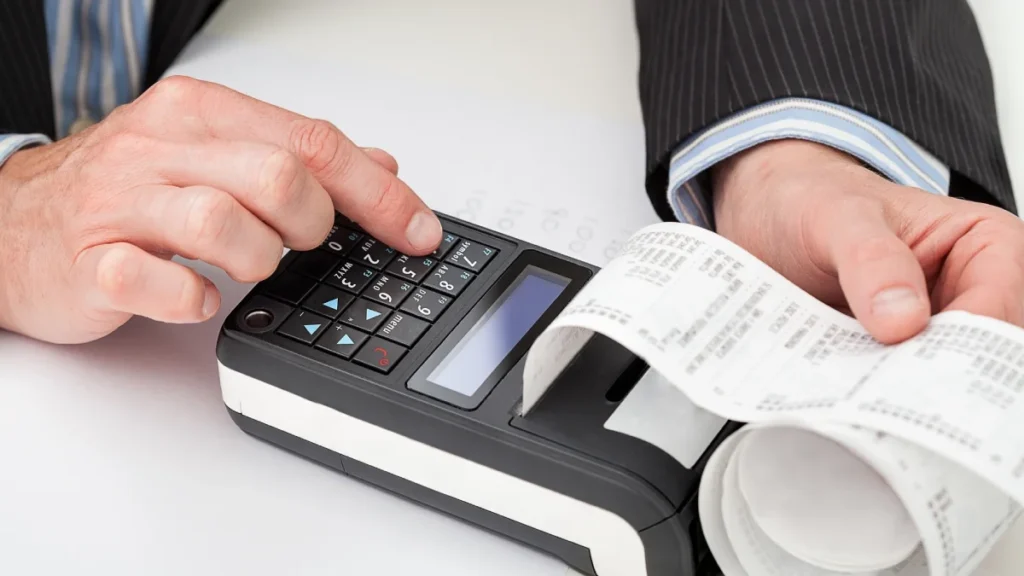
Kasa fiskalna – najważniejsze obowiązki przedsiębiorcy
Sprzedaż realizowana na rzecz klientów detalicznych – a więc osób nieprowadzących działalności gospodarczej – obwarowana jest w Polsce pewnymi restrykcjami. Do najważniejszych z nich należy konieczność ewidencji sprzedaży na kasie rejestrującej.
Dowiedz się na czym polega ten obowiązek, a także jakie wyjątki przewidziano w tym zakresie.
Czym jest kasa fiskalna i jakie są jej rodzaje?
Kasa fiskalna to urządzenie na którym można zapisać towary i usługi zawierające się w asortymencie określonej firmy, a następnie zaewidencjonować ich sprzedaż. Potwierdzeniem dokonania transakcji jest drukowany paragon fiskalny, który zapewnia nabywcy wgląd m.in. w to za co zapłacił, jakie są stawki VAT poszczególnych pozycji, a także od kogo dokonał zakupu. Kasy fiskalne można sklasyfikować przede wszystkim ze względu na sposób zapisu danych. W tym zakresie można rozróżnić przede wszystkim:
- kasy fiskalne online;
- kasy fiskalne z elektronicznym zapisem kopii;
- kasy fiskalne z papierowym zapisem kopii;
- wirtualne kasy fiskalne w postaci oprogramowania.
Warto podkreślić, że kasy fiskalne powinny posiadać homologację, a więc potwierdzenie zgodności urządzenia z wymaganiami technicznymi oraz przepisami. Przed rozpoczęciem ewidencji sprzedaży na urządzeniu należy również pamiętać o jego fiskalizacji, a w niektórych przypadkach także zgłoszeniu. Pozwala to bowiem na uzyskanie stosownego numeru ewidencyjnego oraz poprawną rejestrację transakcji i wystawianie paragonów.
Kasa fiskalna – kto zobowiązany jest do jej posiadania?
Punktem wyjścia do omówienia tematu rejestracji operacji gospodarczej na kasie fiskalnej powinien być art. 111 ust. 1 ustawy z dnia 11 marca 2004 roku o podatku od towarów i usług, zgodnie z którym podatnicy, którzy dokonują sprzedaży na rzecz osób fizycznych nieprowadzących działalności gospodarczej albo rolników ryczałtowych są zobowiązani prowadzić ewidencje sprzedaży przy pomocy kas rejestrujących. W konsekwencji za regułę można uznać sytuację, w której sprzedaż dokonana przez przedsiębiorcę na rzecz klienta detalicznego jest dokumentowana za pośrednictwem paragonu fiskalnego.
Warto jednak bliżej omówić to, czy w każdej sytuacji przedsiębiorca ma obowiązek posiadać kasę fiskalną. Minister finansów w drodze rozporządzenia zwolnił bowiem wybrane grupy podmiotów z obowiązku stosowania tych urządzeń, jak również przewidział pewne wyjątki w zakresie konieczności dokonywania tego rodzaju ewidencji. Zgodnie z §3. Rozporządzenia Ministra Finansów z 30 listopada 2023 roku w sprawie zwolnień z obowiązku prowadzenia ewidencji sprzedaży przy pomocy kas rejestrujących, z takiego zwolnienia można skorzystać w przypadku, gdy przedsiębiorca spełni jeden z dwóch warunków.
Po pierwsze w poprzednim roku podatkowym obrót ze sprzedaży na rzecz osób fizycznych i rolników ryczałtowych nie mógł przekroczyć 20 000 złotych, a przedsiębiorca jednocześnie nie miał obowiązku dokonywania ewidencji na kasie fiskalnej
Należy jednak pamiętać, że:
- w przypadku podmiotów, które rozpoczęły działalność w roku poprzednim, wartość obrotu ustala się proporcjonalnie do okresu wykonywania czynności;
- w odniesieniu do podatników rozpoczynających sprzedaż po 31 grudnia 2023 roku, zwolnienie przysługuje w sytuacji, gdy przewidywana przez podatnika wartość obrotu na rzecz osób fizycznych lub rolników ryczałtowych – proporcjonalnie do okresu wykonywania tych czynności – nie przekroczy wskazanej powyżej kwoty.
Wskazane proporcje można obliczyć dzieląc limit zwolnienia przez liczbę dni w roku, a następnie pomnożyć przez limit dni pozostały do końca roku. Taki wzór pozwoli ustalić ile limitu pozostało jeszcze do wykorzystania.
Należy podkreślić, że zwolnienie traci moc po upływie dwóch miesięcy następujących po miesiącu, w którym limit został przekroczony.
Kolejny warunek zwolnienia dotyczy grupy podatników którzy dokonują sprzedaży towarów i usług wymienionych w załączniku I do rozporządzenia (np. usługi związane ze zbieraniem odpadów niebezpiecznych, usługi pocztowe i kurierskie, usługi finansowe i ubezpieczeniowe, czy czynności notarialne). Zwolnienie to przysługuje jednak tylko wtedy, gdy w poprzednim roku obrotowym udział tego rodzaju sprzedaży w obrotach ogółem wyniósł co najmniej 80%. Jeżeli podatnik rozpoczął wykonywanie tego typu czynności w roku bieżącym, to zwolnienie to przysługuje, gdy przewidywany przez użytkownika udział procentowy:
- za okres 6 miesięcy prowadzenia działalności;
- okres pozostały do końca roku w przypadku, gdy wynosi on mniej niż 6 miesięcy
– będzie wyższy niż 80%.
W sytuacji, gdy opisywany udział był równy lub niższy niż 80% obrotu, to zwolnienie traci moc po upływie dwóch miesięcy licząc od zakończenia półrocza danego roku podatkowego w którym z niego skorzystano.
Istotne jest również to w jaki sposób liczyć obrót stanowiący podstawę zwolnienia. Należy bowiem pamiętać, że obrót to wszelkie wpływy lub należności z tytułu dostaw towarów i usług. W przypadku podmiotów będących płatnikami VAT obrót ten liczy się od wartości netto dokonanej sprzedaży. Trzeba również mieć na uwadze, że do limitu liczy się cała sprzedaż, a nie jedynie zapłaty dokonane w gotówce.
Wyłączenia ze zwolnienia z obowiązku posiadania kasy fiskalnej
Przedsiębiorcy dokonujący sprzedaży na rzecz detalistów powinni mieć na uwadze to, że prawodawca przewidział, iż niektóre rodzaje transakcji powodują wyłączenie ze zwolnień z obowiązku posiadania kasy fiskalnej. Dokonywana na rzecz osób fizycznych sprzedaż objętych tym zestawieniem pozycji powinna być zatem każdorazowo ewidencjonowana na kasie fiskalnej. Warto podkreślić, że wśród nich znajduje się wiele popularnych obszarów działalności, w tym m.in.:
- dostawy:
- gazu płynnego;
- części do silników, silników do napędu pojazdów i motocykli, nadwozi pojazdów silnikowych, przyczep i naczep, części i akcesoriów do pojazdów silnikowych;
- komputerów, wyrobów elektronicznych i optycznych;
- określonych wyrobów z metali szlachetnych;
- wyrobów tytoniowych;
- perfum i wód toaletowych;
- świadczenie usług w zakresie:
- naprawy pojazdów silnikowych i motorowerów;
- wymiany opon lub kół dla pojazdów silnikowych oraz motorowerów;
- usług fryzjerskich, kosmetycznych i kosmetologicznych;
- określonych usług prawniczych i usług doradztwa podatkowego;
- określonych usług przewozów pasażerskich oraz usług taksówek.
Powyższe zestawienia zawiera jedynie przykładowe wyliczenie, natomiast szczegółowy wykaz towarów i usług wyłączających możliwość zastosowania zwolnienia określony został w §4. Rozporządzenia.
Kasa fiskalna w sklepie internetowym
Kolejnym aspektem, który warto poruszyć jest zwolnienie z obowiązku posiadania kasy fiskalnej w przypadku sklepów internetowych. W tym przypadku obowiązuje przede wszystkim opisany wcześniej, liczony proporcjonalnie limit 20 000 złotych obrotów. Trzeba jednak wiedzieć, że w tym zakresie przepisy przewidują również dodatkowe udogodnienia. Przedsiębiorca nie musi bowiem ewidencjonować sprzedaży na kasie fiskalnej, gdy łącznie spełni trzy warunki:
- dostawa produktów odbywa się w systemie sprzedaży wysyłkowej;
- zapłata za towar przekazywana jest na rachunek bankowy lub rachunek w spółdzielczej kasie oszczędnościowo-kredytowej, której dany przedsiębiorca jest członkiem;
- na podstawie dokonanej na rachunek wpłaty możliwe jest jednoznaczne zidentyfikowanie transakcji oraz danych nabywcy.
Należy jednak pamiętać, że – podobnie, jak w przypadku limitu wynikającego z obrotów – zwolnienie to nie obejmuje sprzedaży towarów i usług określonych w §4. Rozporządzenia. Nie będzie miało również zastosowania w przypadku, gdy nabywca zamówi towar przez Internet a odbierze i opłaci go osobiście w punkcie stacjonarnym.
Kiedy można zrezygnować z kasy fiskalnej i czy można przenieść ją na inną firmę?
Przedsiębiorca, który w poprzednich latach dokonywał ewidencji na kasie fiskalnej, w określonych przypadkach może zrezygnować z jej użytkowania. Zasadniczo w takiej sytuacji znacznie mają opisane wcześniej wyłączenia z obowiązku stosowania kas rejestrujących. Po pierwsze zatem, prawo do rezygnacji posiadać będzie przedsiębiorca, który:
- w poprzednim roku podatkowym nie przekroczył 20 000 złotych limitu obrotu z tytułu sprzedaży towarów i usług na rzecz klientów detalicznych;
- nie wykonywał czynności, które podlegają obowiązkowej ewidencji na kasie fiskalnej;
- w poprzednich latach nie utracił prawa do zwolnienia.
Ponadto prawo do rezygnacji z kasy fiskalnej przysługuje również tym podatnikom, którzy dobrowolnie rozpoczęli prowadzenie tego rodzaju ewidencji.
Kolejna warta omówienia kwestia dotyczy używania starej kasy fiskalnej w nowej firmie. Należy podkreślić, iż prawo nie wyklucza takiej możliwości, jednak wiąże się to z pewnymi restrykcjami. Przede wszystkim należy pamiętać, że kasa fiskalna powiązana jest z określonym przedsiębiorstwem, dlatego zmiana właściciela pociąga za sobą konieczność zmiany numeru NIP, co jest możliwe wyłącznie poprzez wymianę modułu fiskalnego. Zanim kasa zmieni właściciela powinno się wystawić zaległe raporty – dzienny i miesięczny. Następnie serwisant dokonuje odczytu pamięci kasy fiskalnej, wystawia stosowne protokoły i instruuje o dalszych krokach czyli o tym jakie dokumenty, w jakim terminie należy dostarczyć do Urzędu Skarbowego. Następnie kasa u nowego właściciela powinna ponownie przejść proces fiskalizacji.
W tym miejscu warto też podkreślić, że określonych działań wymaga nie tylko zmiana firmy, która będzie używać kasy fiskalnej, lecz również zmiana miejsca w którym będzie ona wykorzystywana. W takim przypadku należy poinformować o tym fakcie Naczelnika właściwego Urzędu Skarbowego, a także dokonać określonych zmian w książce kasy oraz danych zapisanych w pamięci.
Ulga na zakup kasy fiskalnej – kiedy przysługuje i kto może się o nią ubiegać
Kolejne zagadnienie, które wzbudza wiele pytań u przedsiębiorców to prawo do uzyskania ulgi na kasę fiskalną. Zgodnie z art. 111 ust. 4 ustawy o podatku od towarów u usług w przypadku gdy:
- u przedsiębiorcy powstał obowiązek ewidencjonowania sprzedaży na kasie rejestrującej online i rozpoczął on taką ewidencję w stosownym terminie;
- nie powstał obowiązek ewidencji sprzedaży na kasie, lecz przedsiębiorca rozpoczął taką ewidencję oraz dotychczas nie używał kas rejestrujących;
– to ma on prawo odliczyć od należnego podatku kwotę 90% ceny zakupu kasy, jednak nie więcej niż 700 zł. W cenie zakupu podlegającej odliczeniu nie zawiera się podatek.
Należy też podkreślić, że gdy w danym okresie rozliczeniowym wartość przysługującego z tego tytułu odliczenia jest wyższa, niż wartość podatku należnego, to podatnik ma prawo wystąpić o zwrot tej wartości na rachunek bankowy lub też odliczyć różnice w kolejnych okresach rozliczeniowych. Dodatkowym warunkiem w tym zakresie jest jednak to, by od momentu zakupu do momentu rozpoczęcia ewidencji nie upłynęło więcej niż 6 miesięcy.
Warto też nadmienić, że prawo do odliczenia uzależnione jest od dwóch przypadków. Po pierwsze przedsiębiorca powinien posiadać fakturę zakupu oraz dowód zapłaty całej należności z tego tytułu. Po drugie ewidencje należy rozpocząć nie później, niż w obowiązującym terminie, przy użyciu kas nabytych w okresie, kiedy urządzenia te spełniały funkcje określone w art. 111 ust. 6a ustawy o podatku od towarów i usług.
Faktury do paragonu – kiedy można wystawić fakturę dla kontrahenta detalicznego?
Nabywca towaru lub usługi – nawet jeśli nie prowadzi działalności gospodarczej – może domagać się od nas wystawienia faktury. Sprzedawca jest zobowiązany do wystawienia takiego dokumentu w przypadku, gdy wniosek wpłynął do niego w ciągu trzech miesięcy licząc od końca miesiąca w którym nastąpiła dostawa towaru lub realizacja usługi. W sytuacji, gdy wniosek ten wpłynął w terminie powyżej trzech miesięcy od daty wystawienia paragonu, to sprzedawca może odmówić wystawienia takiego dokumentu.
Określony w przepisach termin na wystawienie takiej faktury określony został na dwa sposoby:
- jeżeli żądanie zgłoszono w miesiącu w którym nastąpiło wystawienie paragonu (dokonanie dostawy lub wykonanie usług), to fakturę powinno wystawić się nie później niż do 15 dnia następującego po miesiącu w którym nastąpiła sprzedaż;
- gdy zgłoszenie nastąpiło w po zakończeniu miesiąca w którym miała miejsce sprzedaż, to sprzedawca zobowiązany jest do wystawienia faktury w ciągu 15 dni od dnia wystąpienia z takim żądaniem.
Należy też pamiętać, że wystawiając fakturę należy poprosić o zwrot paragonu.
Podsumowując więc przed rozpoczęciem działalności gospodarczej w ramach której zamierzamy dokonywać sprzedaży na rzecz osób fizycznych warto dobrze rozpoznać nasze obowiązki w zakresie rejestrowania zdarzeń na kasie fiskalnej. Niedopatrzenia w tym zakresie mogą być bowiem podstawą do nałożenia kary grzywny. W tym zakresie zawsze należy mieć na uwadze to, że generalna zasada wymaga dopełnienia obowiązku rejestracji na kasie fiskalnej w przypadku każdej sprzedaży detalicznej, a ewentualne limity i wyłączenia należy traktować w kategorii wyjątku – szczególnie, że w tym zakresie również przewidziany został obszerny katalog włączeń.


Dodaj komentarz